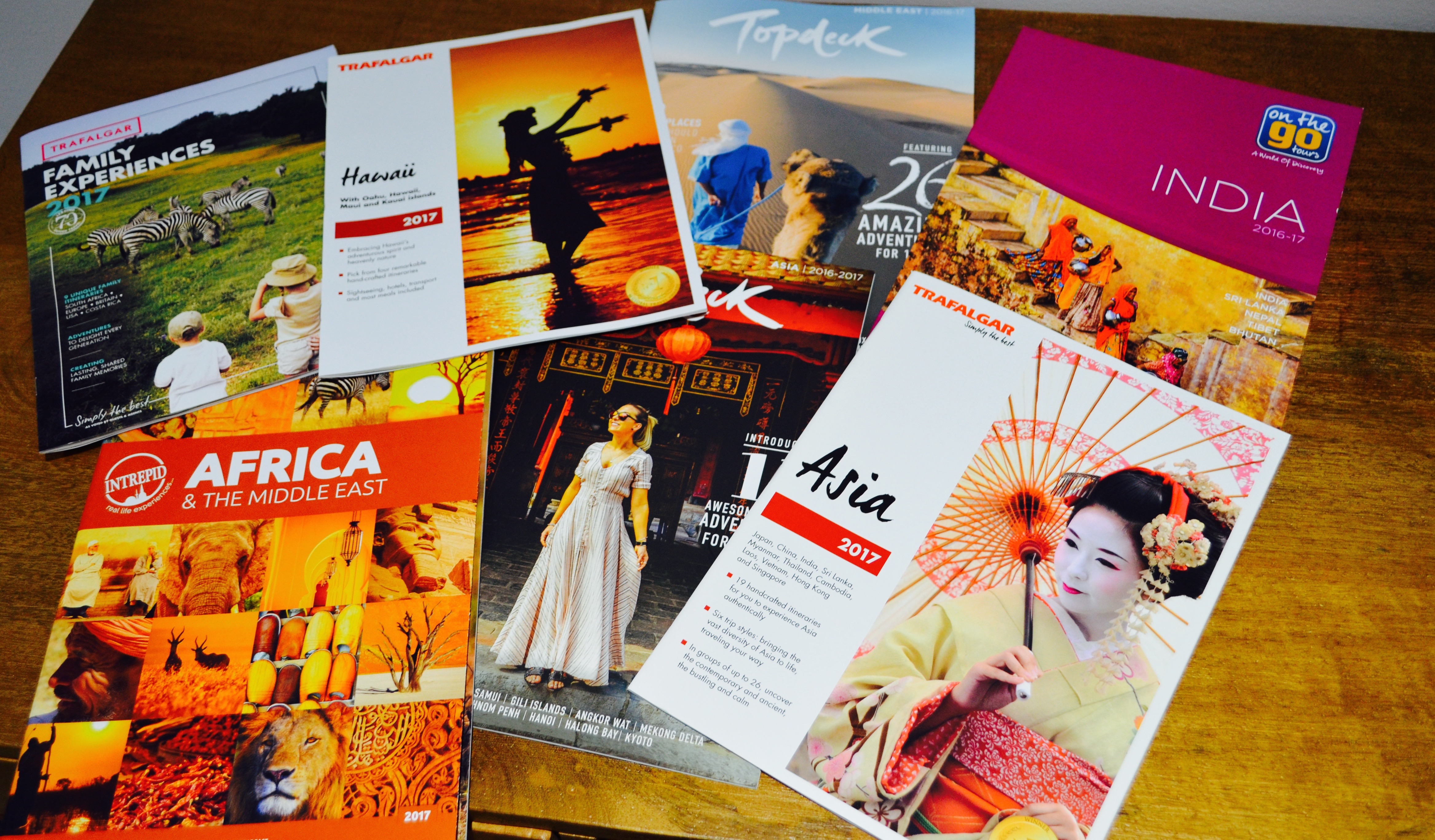Erasure of Culture Complexity
When I had strolled into a travel agency here in Vancouver, I was instantly bombarded with a wide variety of pamphlets, booklets and brochures that all tried to sell the same thing, a new experience. The photo above illustrates the various ‘exotic’ locations one can be transported to by just booking a trip. Agencies like these cash in on others wanderlust. But we often get so caught up in the colourful and enticing pictures that we end up loosing sight of the problem that is displayed right in front of our own eyes. I am referring the use of foreign cultures as a mechanisms to lure Westerners into a capitalistic trap. We have learnt that the enterprise of travel and tourism is a part of the knowledge production. As we discussed in lectures, places outside of our western country usually get minimized to a commodity, and the need for travel and tourism supports the “projects of Orientalism and colonialism” (JP Catungal, 2017).
In the image above we are able to focus on how cultures and places are romanticized and given a flat meaning. On the cover of the ‘Asia’ booklet, we are shown a Geisha figure. Now, as we have discussed in class before, this bluntly shows the wide sexualization of the Orient. By solely showing this image it is clear that the normalcy of sexualization and feminization of the Orient is greatly attractive to western folks. The impression this cover makes is that all Asia, as a continent, has to offer is docile, yet erotic women and a non-complex culture. On another cover, this time for ‘Hawaii’, we are shown the silhouette of a Hawaiian girl hula dancing. This might seem innocent but the cut definitely goes deeper than that. Not only does this cover commodify the art of Hawaiian dance, but it reminds me of the various travel posters that we have analyzed in class of the silhouette of women from different backgrounds. The silhouette of the woman represents a mystery that is waiting to be discovered and the gorgeous colours of the sunset make the woman seem more ‘inviting’. This alludes to the normalization of foreign women being seen as land that is waiting to be claimed, a.k.a colonization of the bodies of the Other.
Throughout all these covers, we aren’t shown any images of people enjoying their own culture. Instead the Other is only shown for the entertainment of white folks and not actually as themselves. It’s like they are reduced to only provide entertainment and enjoyment for white people.
Now that I have established how Western folks erase the complexity of cultures through tourism, I want to acknowledge that I, a women of colour, am also a part of this erasure. I’d like to expand on the personal connection I have to June Jordan’s piece “A Report to the Bahamas” where she, a wealthy black women, travels to the Bahamas and encounters other black women who face the same adversity as her but still end up more worse off. Jordan explains how the other black women she encounters fight for a sale so that they can survive, while she fights for a bargain so that she doesn’t go over budget. This contrasts the women of the same skin tone yet with completely different lives due to where they come from. I relate to this experience whenever I go to India. Like Jordan I meet many women, who play a part in the capitalist enterprise of tourism, that sell handmade goods. Whenever either my family or I want to buy clothing, souvenirs, etc. in India we always fight for a bargain, even though we know the value of our dollar is highly thirsted upon there. I thought it was normal thing to do but after reading Jordan’s text my eyes have been opened. As Jordan explains “We are not particularly women anymore; we are parties to a transaction designed to set us against each other” (Jordan, 2003, pg. 8)
Through systems of travel, tourism, idea of the Other, colonialism, and romanticization of the Orient, we all play a part of the capitalistic enterprise that aids the erasure of culture complexity.
Works Cited:
Jordan, J. (2003). Report from the Bahamas, 1982. Meridians, 3(2), 6-16. Retrieved from http://www.jstor.org/stable/40338566
Catungal, JP (2017). Travel and tourism [Powerpoint Slides]. Retrieved from https://connect.ubc.ca/bbcswebdav/pid-4041072-dt-content-rid-20999091_1/courses/SIS.UBC.GRSJ.102.002.2016W2.75486/102%20Lecture%2011.pdf
